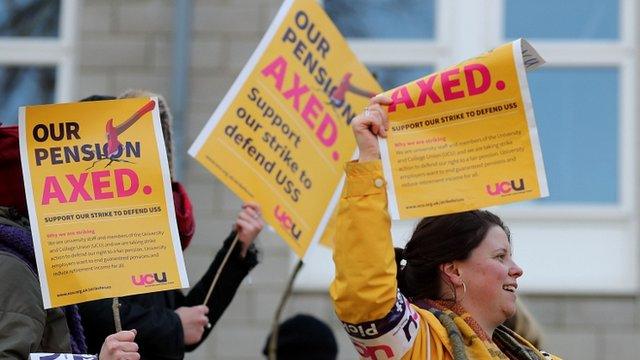Universities should pay back students for strike, says minister
- Published

The universities minister says students should have refunds for lessons lost to strikes
The universities minister says students whose courses have been disrupted by the university strike should receive compensation for lost classes.
Sam Gyimah said this could mean a refund on tuition fees or rearranging cancelled lectures.
At the launch of a new higher education regulator, Mr Gyimah told universities this was the "age of the student" and they deserved better value for money.
King's College London says it will have a fund to compensate students.
The university says that it will ring-fence any savings from staff pay on strike days and use the money to "offset the impact of the strike on our students".
'Winds of change'
A King's spokeswoman said they would be "considering cases for any further compensation that may be warranted in light of cancelled classes".
Mr Gyimah also called on university staff to suspend their strike action, ahead of talks with employers.
The universities minister, speaking in Westminster at the launch of the Office for Students, said he was "very serious" about universities paying back students who had missed out on classes during the strike over pensions.
He said that the wages saved by universities because of the strike could be used to support students, rather than kept by institutions.
Universities UK did not want to respond to calls for refunds, but said: "The focus of universities is on making every effort to work with students to minimise disruption to their academic experience."
Mr Gyimah spoke of the importance of students getting what they expected from their courses, whether in teaching hours or the facilities that had been promised.
He told university leaders that they might feel as though this had been an "annus horribilis", with intense scrutiny of vice-chancellors' pay and university funding.

Sam Gyimah says this is the "age of the student", whose rights need to be protected
But Mr Gyimah told them there were no "calmer times ahead", because this tougher accountability was now the new landscape of higher education.
"This is not a blip. We are once again experiencing the 'winds of change' in the university sector," Mr Gyimah told university heads.
Establishing the Office for Students was part of this greater scrutiny, he said.
"Gone are the days when students venerated institutions and were thankful to be admitted. We are in a new age - the age of the student."
But on the level of tuition fees being charged in England, Mr Gyimah appeared to rule out the idea that different subjects, such as science, might have higher fees than arts subjects.
Instead he argued that there should be more diversity in how courses were delivered - such as studying for a degree in two years rather than three.
The idea of scrapping fees completely was "snake oil", he said.
"If it's free, numbers will be capped," he said, arguing that fewer places would mean a narrowing of access for poorer applicants.
Mr Gyimah was speaking in the second week of a university strike, in which staff have walked out over proposed cuts to their pensions.
The UCU university staff union is set to enter conciliation talks with university representatives on Monday.
The union's leader Sally Hunt said that they had put forward "sensible, affordable proposals aimed at resolving the dispute".